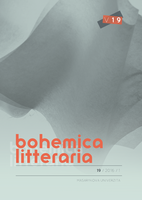Obraz Židů v českém kazatelství přelomu 17. a 18. století: předběžné poznámky
The Representation of Jews in Czech Sermons at the Turn of the 17th and 18th Centuries: Preliminary Notes
Author(s): Daniel SoukupSubject(s): Christian Theology and Religion, Jewish studies, Social history, Czech Literature, 17th Century, 18th Century, Theory of Literature, Sociology of Religion
Published by: Masarykova univerzita nakladatelství
Keywords: Preaching and the Image of Jews; Early Modern Homiletics; Catholic Sermons; Representation of Jews in Literature; Anti-Jewish Rhetoric;
Summary/Abstract: Although Jews and Judaism were marginal topics of early modern preaching in the Czech lands, this paper shows that these rare mentions shaped the image of the Jewish community in Christian eyes, and that the Catholic sermons both guided and partly smoothed the hostile perception of Jews. This article examines Czech collections of sermons from the turn of the 17th and 18th centuries, the period of the official oppression, and the state anti-Jewish policy, moreover focusing on the roots and function of the literary representation of Jews. It is indisputable that preachers, drawing from medieval literature, were fundamentally influenced by the traditional theological concept of Jews as a living witness to the Christian truth. At the same time, baroque sermons reused medieval exempla and miracula preserving narratives about host desecrations, ritual murders, as well as miraculous conversions. The Jewish figures in the Czech sermons served also as a concetto (conceit), a cornerstone in the structure of conceptual preaching. Due to the increasing number of Bohemian and Moravian Jewry at the end of 17th century, and the socioeconomical tension between Christian and Jewish communities, catholic preachers pursued contemporary topics and criticized unpermitted contacts, allegedly leading to the inferior status of Christians. On the other hand, these critical notes usually were targeted primarily on Christian believers and their laxity in the observance of religious life, as well as ignorance of social hierarchy. Anti-Jewish rhetoric was an integral part of early modern homiletics, however, catholic preachers endeavoured to avoid vulgar and popular anti-Judaism. Based on the analysis of Czech sermons, the pulpit oratory did not represent the official reduction and extirpation policy of the Habsburg dynasty in Bohemia and Moravia, contrarily, there are few examples of preachers who reservedly defended Jewish community against any kind of injustice.
Journal: Bohemica litteraria
- Issue Year: 19/2016
- Issue No: 1
- Page Range: 72-106
- Page Count: 35
- Language: Czech

